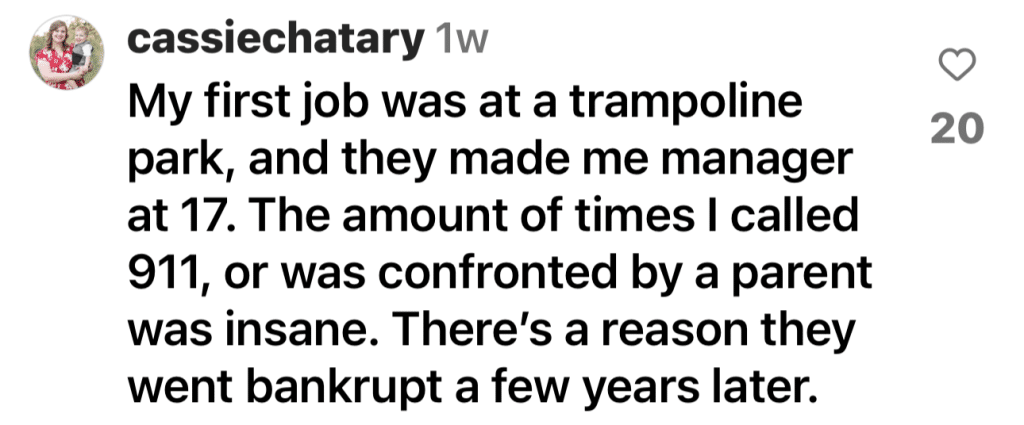As personal injury lawyers, my wife and I chose not to let our young kids go to trampoline parks. Here’s why:
Before you let your child go to a trampoline park for a birthday party or family fun, please know there are hidden dangers among the laughter and flips that might make you reconsider.
Risk of Injury at Trampoline Parks
In 2021, a study in the British Medical Journal found that almost 100,000 kids end up in the emergency room each year because of trampoline injuries in the United States. Even though this news is out there, trampoline parks are becoming more popular. There are 840 of them in the United States as of 2021, and 400 more around the world, according to the journal.
The study also said that kids are more than twice as likely to get hurt in a trampoline park compared to a trampoline at home. This might be because the trampolines in parks are made to have higher tension, which can put more strain on bones and ligaments.
The journal also mentioned that kids using trampoline parks are much more likely to have serious injuries that need surgery compared to those using trampolines at home.
Teens and pre-teens get hurt more often because they like to do risky things in the parks. The article stated that having age limits and more supervision might reduce the number of younger kids getting hurt in trampoline parks.
Another study in 2019 by the Journal of the American Academy of Orthopaedic Surgeons looked at 439 trampoline injuries in a hospital system over two years. It found that 34% of these injuries happened at trampoline parks, and 55% of those were fractures and dislocations. More leg fractures happened at trampoline parks than at home for both kids and adults.
Closer to home, the Fort Worth Star-Telegram found almost 500 reports of injuries in 2015 from 21 trampoline parks in Dallas and Fort Worth. These injuries were serious enough that people had to go to the emergency room. The actual number of people hurt, including those who went to a doctor or hospital, is probably even higher.
Texas Does Not Regulate Trampoline Parks
Trampoline parks in Texas pose a higher risk of injuries, and unlike some other states, they aren’t closely monitored. Only eleven states have rules for these parks, such as having insurance, regular safety checks, and reporting severe injuries to the state. But in Texas, there are no such rules, meaning trampoline parks here don’t have to follow these safety measures or report serious injuries.
Texas trampoline parks are also not required to have insurance, which can make it unclear who is responsible for covering costs if accidents happen. People visiting these parks should be careful because each park might have different rules for insurance. This could make it harder to get compensation for injuries sustained while on their property.
Hidden Risk with Parental Indemnity Agreements
Usually, when kids go to a trampoline park in Texas their guardian has to fill out some paperwork. Part of this paperwork might let the park off the hook if the child gets hurt while playing. In Texas, they say these release forms are okay for grown-ups as long as they meet certain conditions.
In Texas, there’s something called a parental indemnity agreement that’s really important when it comes to trampoline parks. This agreement is like a shield for the park—it helps them avoid being responsible if someone gets hurt. When people (usually parents or guardians) sign an indemnity agreement, they are agreeing to pay for the damages associated with a child getting hurt, even if the injury resulted from the negligence of the park (as opposed to simply a risk that is assumed).
It’s important to note that generally speaking, waivers are not applicable in Texas for children. In other words, a parent or guardian cannot waive a child’s rights. A court case in the Southern District of Texas (Paz V. Life Time Fitness, Inc., 757 F. Supp. 2d 658, 2010) addressed this issue. The court decided that a release form for a child’s claims couldn’t be enforced if there was a business involved, unlike situations with nonprofit groups.
However, trampoline parks are using parental indemnity agreements as a workaround. The child’s suit could technically still be brought, but the parent or guardian would have to pay for it. There is a good argument that parental indemnity agreements are not binding in Texas, but the jury is still out on that.
If you want more details on the legal side of these agreements, you can check out The Texas Department of Insurance.
Know Your Risks
Parents and kids should be careful when it comes to activities like trampoline parks because there aren’t clear rules to keep visitors safe. Even though trampoline parks seem like a fun and innocent way to have a good time, there are hidden dangers that parents need to think about. From the high chance of getting hurt to the lack of consistent rules and potential safety issues, trampoline parks raise serious worries about our children’s well-being.
As parents, it’s our job to put our kids’ safety and health first, even if it means choosing activities that are less thrilling in the moment. There are other, safer options for fun and exercise that don’t come with the same risks.
Still not convinced? Take a look at what other people, not just lawyers, are saying about the increased dangers at trampoline parks here in Texas.



















